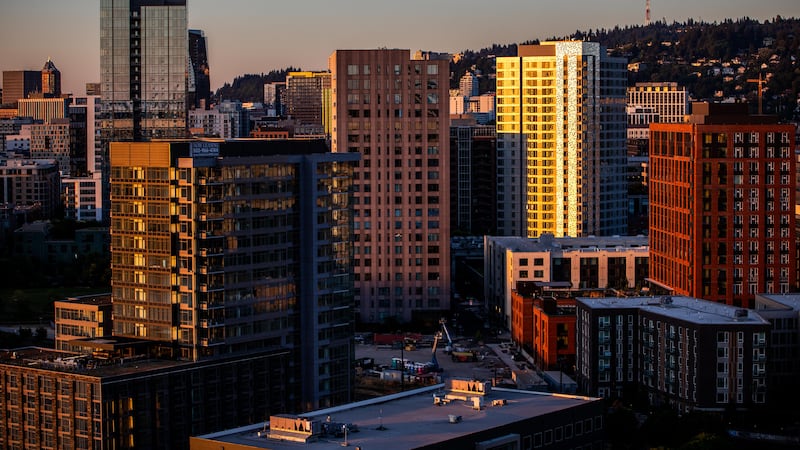For months, regional government Metro has publicly weighed asking voters to repurpose some supportive housing services tax dollars to fund the creation of more low-income housing. That debate is already entrenched, with counties crying poor and candidates for office taking sides (see “One Question,” below).
Amid that argument, another data point has emerged: Existing apartment buildings are for sale at discount prices.
That raises a question: Should Metro, in its quest to create more subsidized apartment units to calm the homelessness crisis, also explore buying up existing apartments?
Below are three questions that help frame the discussion as the Metro Council awaits a recommendation from its chief operating officer about what the controversial ballot measure should propose if and when it’s sent to voters in November.
WHAT’S THE PLAN?
Metro is considering placing a measure on the November ballot that would divert some of the supportive housing services dollars from three Portland-area counties and build affordable housing with those dollars. The tax on high-income earners and businesses, passed by voters in 2020, collected $336 million in fiscal 2022-23.
The Metro Council and major stakeholders, most importantly the chairs of Multnomah, Washington and Clackamas counties, have met a handful of times in recent months to discuss the idea. The chairs have so far shown little enthusiasm for surrendering any of the SHS money to Metro for affordable housing, despite their struggle—particularly in Multnomah County—to spend the tax dollars on time.
Those objections have not deterred the Metro Council from exploring the idea.
WHAT’S THE OPPORTUNITY?
Should Metro place and pass a measure in November that repurposes SHS funding for affordable units, there’s an unusual window to use some of that money to buy existing apartment buildings and turn them into low-income units.
It’s much cheaper to buy existing units than to build entirely new ones—especially now.
The residential real estate market is in a downturn, partly driven by rising vacancy rates, so apartment buildings are going up for sale at lower prices than are typical. A list of recent apartment building purchases in the central city over the past year, obtained by WW from a major brokerage firm, shows low prices for market-rate apartment buildings.
The 170-unit Skyler Grand Apartments at Northeast Martin Luther King Jr. Blvd and Davis Street, for example, sold in February for $34 million, or $200,000 per unit. The Parker, a 177-unit building in the Pearl District, sold in June 2023 for $293,000 per unit.
Recent affordable apartment buildings built from scratch using Metro housing bond dollars cost between $412,000 and $522,000 per unit. (Metro does a good job of minimizing its construction costs by leveraging tax credits, so the agency only paid between $140,000 and $192,000 per unit for recent builds. Total costs remain high, however, and construction of new apartment buildings takes at least two years.)
In an April 17 scenario laid out by Metro in a brainstorming session on a potential SHS ballot measure, Metro estimated spending $230,000 per newly built unit and $255,000 on existing units with the help of private debt.
Executive director Gary Fisher of MultiFamily NW says low apartment building prices should turn Metro’s head.
“Apartment sales are at record lows—and if Metro sees an opportunity to get more people into supportive housing faster, they should take it,” Fisher says. “With permitting times lagging around the Portland metro region and development costs soaring, it certainly seems like purchasing existing units is a more efficient use of taxpayer resources.”
WHAT DOES METRO SAY ABOUT IT?
Metro spokesman Nick Christensen says Metro’s chief operating officer is considering all options, including buying existing apartment buildings.
“We’ve had conversations about a number of options for affordable housing, including purchasing existing buildings,” Christensen says. “It’s one of the many options that’s being looked at as our chief operating officer prepares her recommendation for the Metro Council to consider.”
But Christensen also says that doing so wouldn’t fix the root of the problem: the lack of housing supply itself. “Obviously, we have a regional need and a market failure to build new housing for Oregonians with lower incomes.”
